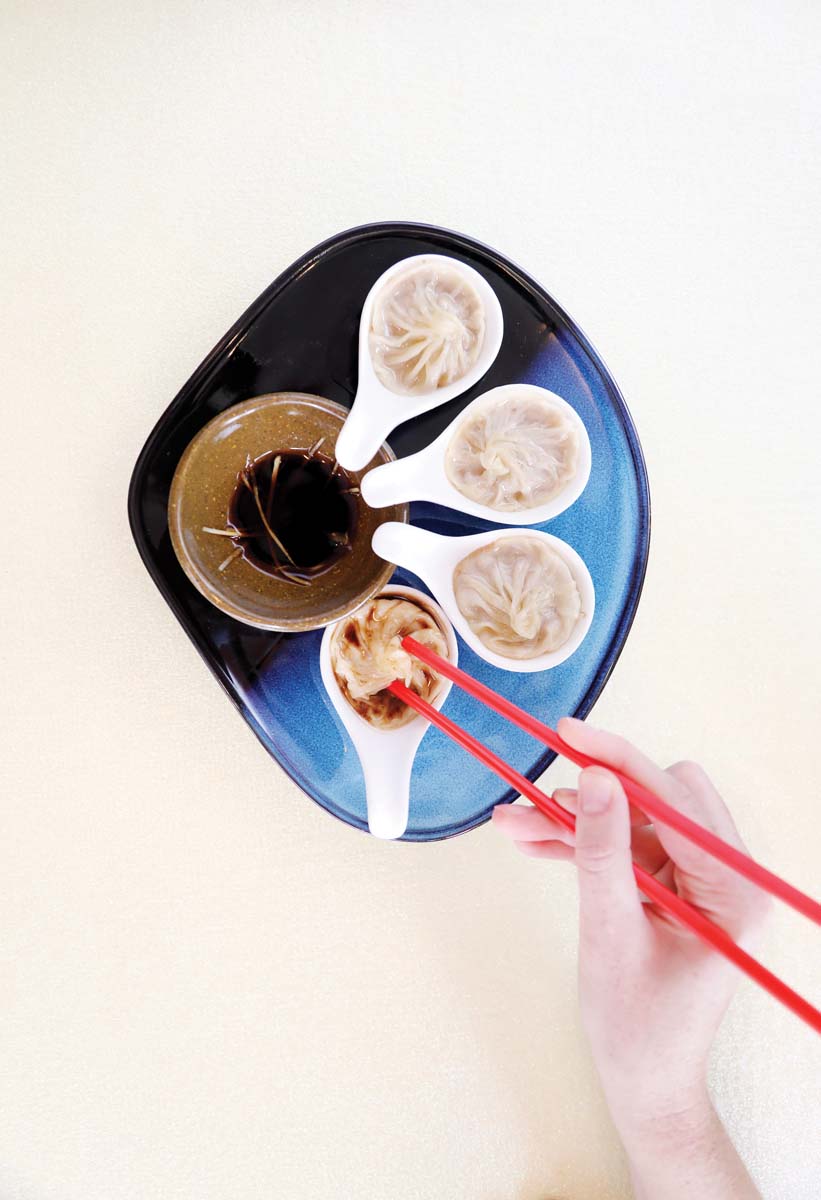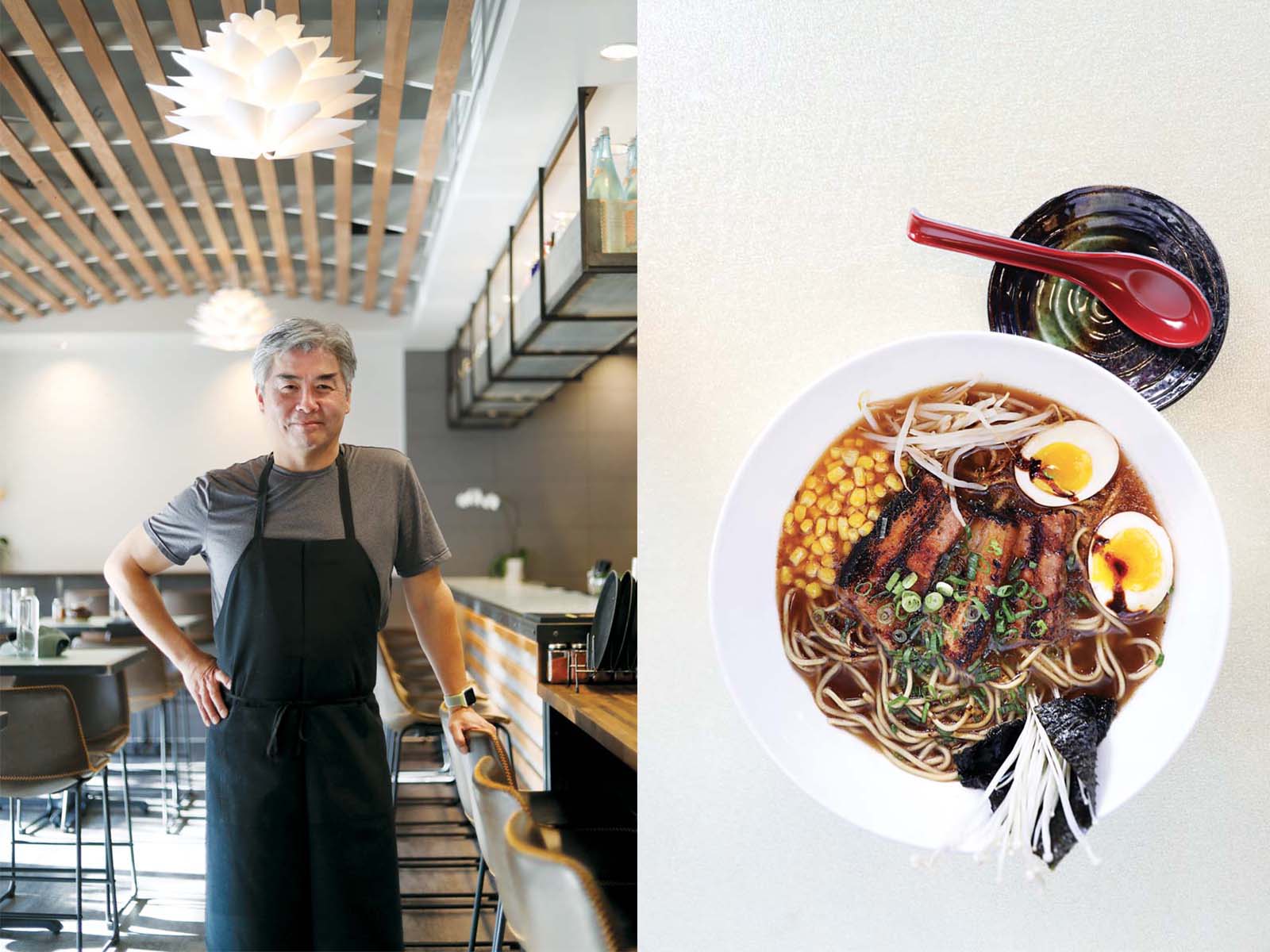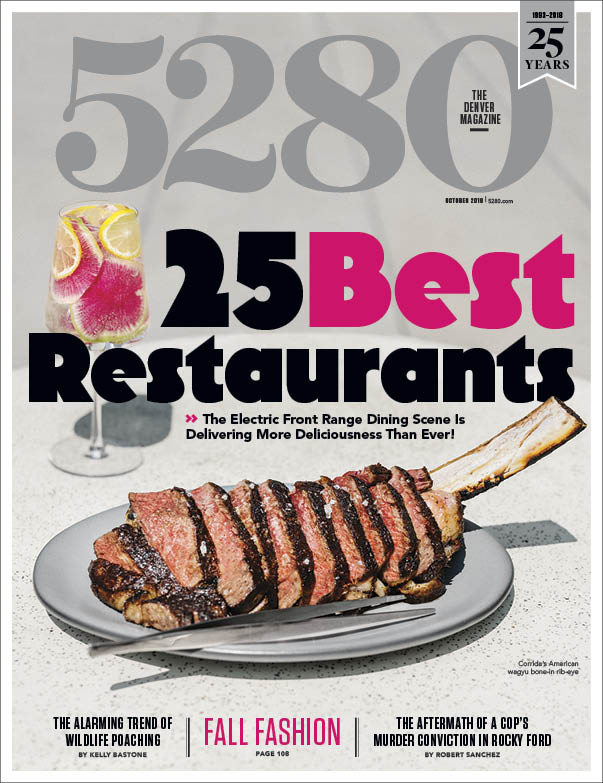The Local newsletter is your free, daily guide to life in Colorado. For locals, by locals.
Chimera
2.5 Stars
- The Draw:
- Handmade ramen and dumplings, serious cocktails
- The Drawback:
- A few dishes need focus
- Don’t Miss:
- Chimera ramen, smashed cucumbers, soup dumplings, vegetable bao
The original Zoe Ma Ma noodle restaurant, located just off Pearl Street in Boulder, has as its primary virtue a happy modesty in size and ambition: It exists to serve quick, slurp-worthy meals. Yes, there are dumplings and rice and bao buns if you don’t want noodles, but I’ve always gone there for the saucy za jiang mian with soy-simmered ground pork and the soupy noodle bowl with Sichuan braised beef.
Food like Zoe Ma Ma’s is what ordinary folks ate every night at food stalls and compact shops when I lived in Southeast Asia as a kid; after we moved there, I was gobsmacked to learn that delicious food could be nothing special. Those places provided what the ordinary diner expected: slow food for fast eating. Zoe Ma Ma’s chef-owner, Edwin Zoe, also subscribes to this ethic. He sources many ingredients locally, makes noodles from scratch using organic flour, and acts as if that’s no big deal. In 2015, success based on that approach led him to open a second Zoe Ma Ma beside Denver’s Union Station.
Since April, Zoe has been presiding over his newest restaurant, Chimera, located next door to the first Zoe Ma Ma in Boulder. The spirit there is similarly friendly, though the room—modern, L-shaped, warmed by wood and brick and lanternlike pendants—is bigger, with plenty of tables and a full cocktail bar. At lunch, Chimera is basically a ramen joint with a few starters thrown in. In the evenings, the focus remains on the ramen, but the menu offers much more.
Chimera is Pan-Asian, but not in the chef-y way a place like Q House in Denver is, with its smoked trout fried rice and smelts with ginger dipping sauce. At Chimera, Pan-Asian simply means there are dishes plucked from here and there across the Pacific Rim. There is some ingredient cross-pollination: Zoe adds “togarashi,” a Japanese spice blend, to a delectable vegetarian bao filled with crunchy, panko-crusted fried eggplant; he drops butter-poached lobster meat into a luxe bowl of ramen. There’s even, out of left field, a ceviche. But Zoe’s cooking is less about riffing than about attending to simple details.
For example, boiled eggs. When I arrived for lunch one August afternoon, Zoe was peeling a dozen or so with such gentle hands that the eggs might have contained nitroglycerin. Then he delicately halved them using a razor-sharp Japanese knife. The deep orange yolks were goopy, almost like pudding. Nothing special—just how eggs should be prepared for ramen.
Similar care goes into the house broth, served in the namesake Chimera ramen bowl, which has exactly the right amount of lip-coating collagen pulled out of bones by slow simmering. One night as I was leaving dinner, I ran into Zoe—he routinely greets and bids goodbye to guests at Chimera—and asked him if I detected the faintest hint of star anise in that broth. “You don’t expect me to tell you my secret, do you?” he laughed, and then proceeded to tell me his secret: a blend of chicken and pork broths for the base, plus a touch of Chinese duck broth, with its welcoming whisper of anise-tinged five-spice powder.
Arranged in that aromatic broth were roast pork belly, enoki mushrooms, sprouts, a sheet of nori, and a handful of corn kernels, as well as house-made ramen noodles (rare in these parts), which are hand-massaged to a slightly angular circumference and nubby texture that results in proper chew and broth-cling. It is a rich and focused treat, and a suitable solo meal.

At a recent lunch, the spicy red ramen, fiery with a tongue-numbing sansho-chile oil, was less successful, a bit off-balance from too much spice, though its succulent slices of chicken thigh had a mighty char from the grill. The lobster version at dinner, which goes for $25, was perhaps not quite worth the extra 10 bucks over the Chimera version, but I like lobster, and I liked the lobster-y broth.
Over two dinners, I ate my way through most of the menu’s appetizers. The aforementioned eggplant bao were delightful, and I enjoyed the pork belly bao as well, because what’s not to love about fluffy-meets-porky-fatty? Duck dumplings were quite ducky, with moist shredded meat tasting, again, of five-spice. The only fault was a too-thin wrapper that made the dumpling a bit floppy. Chimera’s Shanghai soup dumplings, on the other hand, were little gems, served in soup spoons and filled with crabmeat, pork, and steaming broth.
A bowl of smashed cucumbers—logs of the Asian variety resting in a vinaigrette of sesame oil and rice vinegar and tossed with an abundance of minced dried shrimp—was simple, pretty, and satisfying. Crisp, deep-fried chicken wings flavored with “mala” (a Sichuan dry rub of anesthetizing peppercorns, chiles, and other spices) were ideal drinking snacks. Yuzu-tinged hamachi crudo, meanwhile, was actually not very special, a standard-issue raw fish dish that you’ll find in any decent Japanese restaurant these days. Stir-fried long beans had the beginnings of a good wok sear, but not enough of it—they lacked the wrinkle-skinned, al dente texture that comes from rocket-hot burners and lots of tossing.
Many of these starters were good eating, but the kitchen got into trouble with a few nonramen entrées. I tried the bulgogi Korean barbecue dish twice to see if the lack of grill char on the rib-eye was a one-night misfire. Alas, no: The meat was flabby on both occasions. The banchan trio, an assortment of side dishes, half succeeded with succulent garlic cloves and funky kimchi but went astray with a run-of-the-mill Japanese seaweed salad and some overly vinegared pickled shishito peppers. The Everybody Chow Fun plate of broad rice noodles was also underwhelming, not because of the noodles, which were supple and chewy, but because the flavor—coming from oyster sauce, fish sauce, chile paste, ginger, and more—was somehow bland.
There were also a few bumps on the service side at lunch: a 30-minute wait for the red ramen and a much-delayed plate of cucumbers (I had to remind the server), which was handed over the counter without so much as eye contact. But dinner service was smooth and friendly, and overall, Chimera is, like its sister restaurant next door, a cheerful place.
It’s made cheerier by good drink. There’s a Tiki-ish list of cocktails, including a refreshing pineapple-rum-mezcal concoction called the Foo Dog and a lovely burst of citrus enhanced by vodka dubbed the Forbidden City. The Ryzing Seoul—rye, ginger, mint, lemon—had excellent fresh-ginger zing. Two other cocktails, the Tokyo Drift and the 7th Chamber, were too syrupy for my taste, but it’s nice to see a legitimate cocktail program in a restaurant like this, as well as a list of Japanese whiskies and several sakes; try the Sayuri Nigori, almost creamy from coarse filtering, which reminded me of that strange, delicious, milky Korean rice wine called “makgeolli.”
Despite a few kinks, I came away from Chimera contented, which had a lot to do with the geniality of the chef, I think. Chimera is a hipness-free zone, and kudos to Zoe for that. It’s a place to tuck into plates of smashed cucumbers and slurp soup dumplings and bowls of ramen and toast the street ethic of “nothing special”—which of course turns out to be special indeed.









